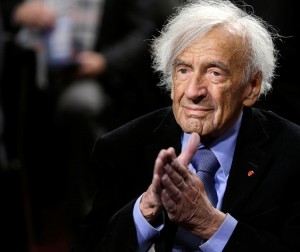Elie Wiesel (1928-2016)
Wednesday, July 6th, 2016July 6, 2016
On Saturday, July 2, Romanian-American author Elie Wiesel died at age 87. Wiesel dedicated his life to describing the horrors he witnessed during the Holocaust and to helping victims of oppression and racism. The Holocaust was the systematic, state-sponsored murder of Jews and others by the Nazis during World War II (1939-1945). Wiesel won the 1986 Nobel Peace Prize.

Nobel Peace Laureate Elie Wiesel, seen here in 2015, died in New York City on July 2, 2016. Credit: © Gary Cameron, Reuters
United States President Barack Obama was one of several world leaders to pay tribute to Wiesel on Saturday: “He raised his voice, not just against anti-Semitism, but against hatred, bigotry, and intolerance in all its forms. He implored each of us, as nations and as human beings, to do the same, to see ourselves in each other and to make real that pledge of ‘never again.’” Israeli Prime Minister Benjamin Netanyahu also spoke highly of Wiesel: “In the darkness of the Holocaust in which our brothers and sisters—6 million—were murdered, Elie Wiesel was a ray of light and greatness of humanity who believed in the good in man.”
Eliezer Wiesel was born on Sept. 30, 1928, in Sighet, Romania. In 1944, he was sent with his family and the town’s other Jews to a camp at Auschwitz (now Oswiecim), Poland, near Krakow. He was later sent to a camp at Buchenwald, Germany, near Weimar. Wiesel’s parents and a sister died at these camps. After Buchenwald was liberated in 1945, Wiesel settled in France. He later studied philosophy at the University of Paris, became a journalist, and moved to the United States. In 1976, Wiesel became a professor of humanities at Boston University. President Jimmy Carter appointed him chairman of the President’s Commission on the Holocaust in 1979. In 1980, Wiesel was named head of the United States Holocaust Memorial Council.
Wiesel’s humanitarian efforts earned him the 1986 Nobel Peace Prize. The Nobel citation reads in part: “Wiesel is a messenger to mankind. His message is one of peace, atonement, and human dignity. His belief that the forces fighting evil in the world can be victorious is a hard-won belief.”
Wiesel wrote more than 35 books. His first book, Night (1958, revised edition 2006), is a memoir of his experiences in Nazi concentration camps. Dawn (1960) and The Accident (1961) are novels about survivors of the Holocaust. Wiesel’s other books include The Jews of Silence (1966), A Beggar in Jerusalem (1968), The Testament (1980), Wise Men and Their Tales (2003), and A Mad Desire to Dance (2009).


